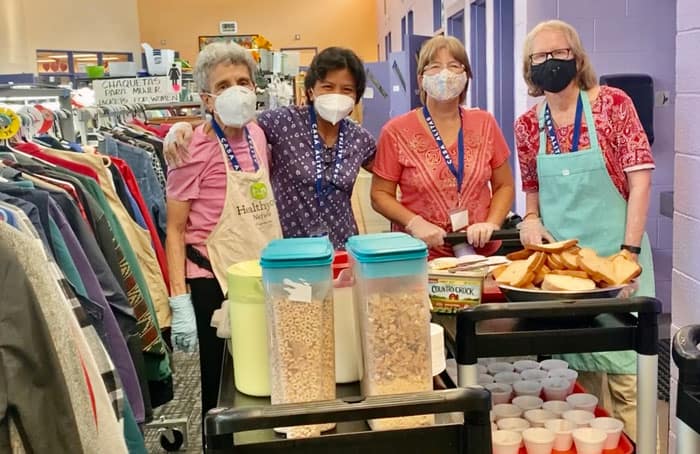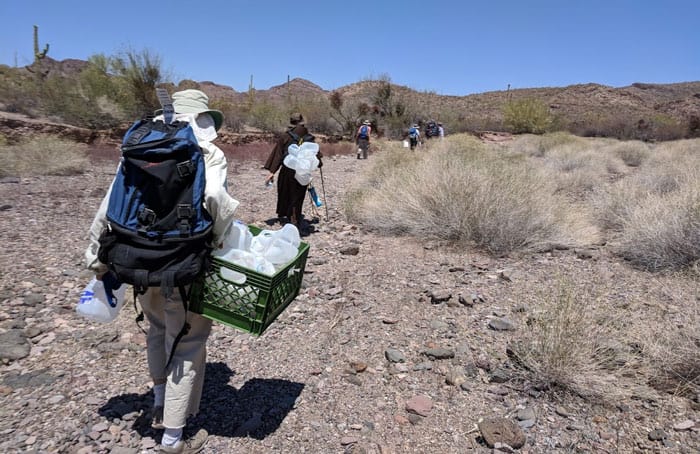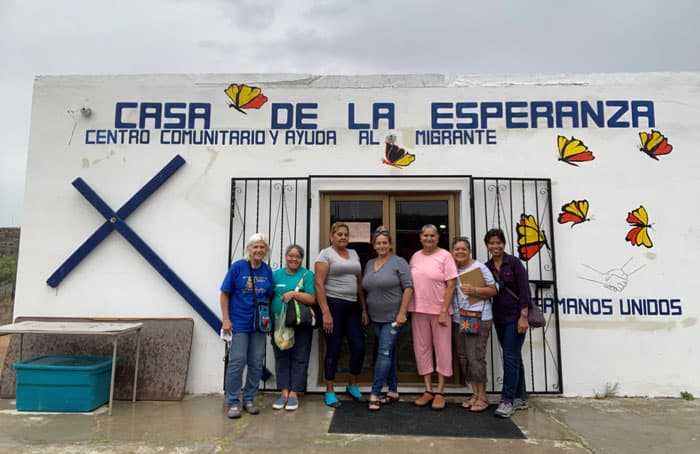Maryknoll Sister Genie Natividad reflects on volunteering at the U.S./Mexico border, where she served migrants and refugees.
At the 104th World Day of Migrants and Refugees in 2018, Pope Francis said, “Every stranger who knocks at our door is an opportunity for an encounter with Jesus Christ.”
Last year, the Maryknoll Sisters received an invitation to serve at the southern border. An appeal came from Catholic Charities to respond to the humanitarian crisis there. Maryknoll Sisters Rosemarie Milazzo, Mary Mullady, Judith (Joy) Esmenda, Janet Hockman, Rolande Kahindo and I answered this call. Our destination — where I volunteered for five months — was Casa Alitas Welcome Center in Tucson, Arizona.
Every day, Casa Alitas (House of Little Wings) welcomes hundreds of migrant men, women and children. They come from different countries: Peru, Colombia, Guatemala, Ecuador, Cuba, Venezuela, Haiti, India and others. After processing, Immigration and Customs Enforcement and Border Patrol agents bring migrants to the center to be assisted.
On one occasion, a bus arrived at Casa Alitas carrying about 50 men in shackles and handcuffs. Electronic monitoring devices had been placed on their ankles. An officer had to unlock the handcuffs hooked to chains around each one’s waist.
I wished I could numb the shock of cruelty I was seeing, as if on stage, from my front row seat. Those men were being treated like criminals. I could not help but see in each one of them the face of Jesus in agony while he was whipped, mocked, and humiliated, robbed of his dignity and self-respect.
First and foremost, asylum seekers come for safety. They come pursuing a dream of a better tomorrow, not only for themselves but for their families. They come, as is often the case, uninvited. They come exhausted. I would have liked to shout out Jesus’ words: “Come to me, all you who labor and are burdened, and I will give you rest.” (Matthew 11:28)

Maryknoll Sisters Rosemarie Milazzo (left), Mary Mullady (right) and Genie Natividad, with a volunteer, prepare breakfast for migrants and refugees at Casa Alitas Welcome Center in Tucson, Arizona. (Courtesy of Genie Natividad/U.S.)
My heart melted at the sight of the weary travelers. We served them food and drink, fresh-cut fruit and warm soup, perhaps their first hearty meal in quite some time. We provided clothing, a shower and shelter, a place where — at least for the time being — they could have the rest that had eluded them amid the strain and stress of their journey.
Some guests would leave the next day, while others had to wait until their sponsors (usually relatives or friends) arranged their tickets for travel. Those needing medical clearance following hospitalization stayed longer. Most heartbreaking, often guests waited to be reunited with family members whose whereabouts were uncertain.
“Give us the grace to endure,” I found myself praying. I bowed in acceptance and deep gratitude for the opportunity to be there. There was something sacred about that gathering place — a crossroads, really. God is in control and all that we could do, as volunteers and staff, was to treat anyone and everyone who came our way with compassion, kindness and respect. We needed look no further than right in front of us. Mission is in the here and now.
I was amazed at the many good-hearted individuals and groups from all walks of life and faith traditions (including Jewish, Muslim and Christian) coming to serve as volunteers — for a day, a week, months or even years. Our task was simply to offer hospitality, responding as best we could to basic human rights and needs.
Casa Alitas partners with Tucson Samaritans and Casa de la Esperanza, sister organizations working for the same purpose. I joined Gail Kocourek, a member of the Tucson Samaritans, to go deep into the Arizona desert to leave food, water and first aid supplies along the migrant trails.

Members of Tucson Samaritans, a humanitarian aid organization, replenish water jugs along migrant trails in the Sonora/Arizona desert. (CNS photo/Peter Tran, Global Sisters Report)
Walking the vast desert with its thornbushes and rough ground, and feeling the heat of three-digit weather, I wondered how many feet and bodies had been pierced by these same sharp rocks. How many more feet would inch their way to this side of the border, amid all the dangers of the journey.
How many more dehydrated people and dead bodies will be found on these paths, migrants who simply could no longer bear the heavy weight? Tired, weary, laden with a heavy yoke on their shoulders, maybe they just want to stop and rest for a bit; some must know that they might never get up again. How many more walls will be erected before we build bridges?
Near the Sasabe, Arizona, point of entry, on the Mexican side of the border, is a welcome center called Casa de la Esperanza (House of Hope). Gail Kocourek helped to found this place — alongside a tremendously dedicated woman named Dora Luz Rodriguez, originally from El Salvador.
One Saturday morning, I went with Gail and Dora to bring supplies to Casa de la Esperanza. During the course of our conversation, Dora recalled that in her youth, religious sisters worked in her village. She remembered one she had been especially fond of, whom the community called “Madre Magdalena.” Madre Magdalena helped so many people, Dora said. I showed her a photo of Sister Madeline Dorsey on our website. Dora was moved to tears, recognizing the kind, familiar face from long ago. “She is Madre Magdalena!” Dora exclaimed.

(Left to right) Gail Kocourek, Maryknoll Sister Joy Esmenda, three volunteers, Dora Luz Rodriguez and Maryknoll Sister Genie Natividad gather at Casa de la Esperanza welcome center on the Mexican side of the border in Sasabe, Sonora. (Courtesy of Genie Natividad/U.S.)
Dora herself had gone through the desert and crossed the border as a teenager. Living all this time in the States, she never forgot Madre Magdalena or the legacy of the Maryknoll Sisters. Now Dora continues the same mission of love.
Indeed, every encounter has the potential of becoming a face-to-face meeting with God. No matter how brief, an encounter is the single most important thing in the present moment.
I witnessed one such encounter when I accompanied a Mexican migrant mother and her 3-year-old son to the airport. While they were waiting to board their flight, another plane arrived. A little American boy about the same age as the Mexican boy walked with his mother off the plane and into the waiting area. On seeing the migrant boy, the newly arrived boy ran — without rhyme or reason — to the young Mexican and threw his arms around him. This hug was reciprocated.
Everyone was stunned. Something totally unexpected was happening before our eyes: a gesture of acceptance with no questions asked, no conditions given; hospitality innocently extended and sincerely received. No words needed to be exchanged. No paper documents had to be produced and stamped. The embrace said it all.
Serving as a volunteer at the U.S./Mexico border, I encountered not strangers, but guests. I got to meet migrants, refugees and asylum seekers during their darkest and most vulnerable moments. I saw the face of Jesus in each encounter, and since then, I have not been the same.
Featured image: Maryknoll Sisters (left to right) Rolande Kahindo, Genie Natividad and Janet Hockman buy backpacks and clothing for migrants at a Goodwill store in Tucson, Arizona, where the sisters served as volunteers at the border. (Genie Natividad/U.S.)
![]()

